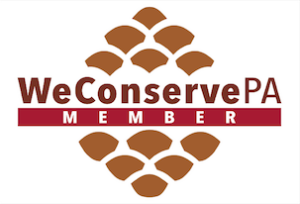The Westmoreland Land Trust views public access as one of the many public benefits of its land and water protection work and as such will permit the broadest access to the property possible without jeopardizing the conservation values for which a property is protected.
Note: The public is advised that entry upon any property shall be at their own risk and that use is governed by the Land Management Plan for WLT properties.
Leave No Trace Practices
WLT embraces the principles of Leave No Trace Center for Outdoor Ethics (LNT). The following are some general practices, modeled on the LNT principles, that apply to all WLT properties. Visitors will be encouraged to practice the following and this information may be included on signage, brochures and/or on the organizations website.
- Pack it in, pack it out. Inspect your areas of visitation for trash or spilled foods. Pack out all trash, leftover food, and litter even if it’s not yours.
- Preserve the past. Examine, but do not touch, cultural or historic structures and artifacts.
- Leave rocks, plants and other natural objects as you find them.
- Avoid introducing or transporting non-native species.
- Do not build structures or furniture, and do not dig trenches.
- Observe wildlife from a distance. Do not follow or approach them. Never feed animals. Feeding wildlife damages their health, alters natural behaviors, and exposes them to predators and other dangers.
- Protect wildlife and your food by storing rations and trash securely.
- Control pets at all times, or leave them at home.
- Avoid wildlife during sensitive times: mating, nesting, raising young, and winter.
- Respect other visitors and protect the quality of their experience. Be courteous. Yield to other users on the trail.
- Let nature’s sounds prevail. Avoid loud noises.
Permitted and Prohibited Uses of WLT Properties
The types of permitted uses will be addressed in each property’s management plan and will be based on the requirements needed to meet the plan’s management objectives and not jeopardize the conservation values and public benefit of the site. Generally, passive recreation, which includes hiking, observing nature, and other similar natural pursuits, is encouraged on WLT properties. The following guidance is provided on uses outside those cited above.
- Snow-shoeing and Cross-country Skiing: These activities are all encouraged on WLT properties. Visitors are encouraged to remain on trails when possible and to wear fluorescent orange during hunting season. WLT views snow-shoeing and cross-country skiing as low-impact, passive uses on its properties and will encourage them as a means to enjoy, understand, appreciate and learn to be good stewards of the natural resources.
- Education and Research: WLT encourages the use of its properties for educational purposes that promote environmental awareness. WLT encourages appropriate research to further our knowledge of species and natural communities on our properties. Any party interested in conducting appropriate research on WLT properties should submit a proposal to the WLT for consideration.
- Recreational Trails: Trails may be constructed on WLT property with the development of an appropriate trail plan that is reviewed and approved by the WLT. The Land Trust may limit the size of groups using our property if, due to the physical characteristics of the property (soils, slopes, sensitive wildlife), it is determined that damage may result from large-group use.
- Geocaching
- Dogs: Dogs are permitted on WLT property unless otherwise posted. Where dogs are permitted, all dogs must be leashed and under the control of the owner at all times. Owners are required to pack out pet waste.WLT recognizes that dogs provide a sense of security and protection for property users. However, dogs can be injurious to wildlife that is a conservation value of the Land Trust. Dogs can also infringe on the activities and enjoyment of other visitors so they must be under control at all times.
- Plant, Wildlife, Mineral, and Historical/Cultural Resource Collecting
- Hunting and Trapping, and Use of Firearms: Hunting and trapping may be permitted on WLT property as a natural resource management tool and/or as determined by the management plan for a specific property. All hunting must be in accordance with Pennsylvania Game Law and local ordinances. Tree stands can be used, but only if they are designed to have no impact to trees and are removed after each use. The use of firearms is prohibited on WLT property, except as part of an approved hunt to manage wildlife.
- Fishing: Fishing, consistent with state law, is permitted on WLT property unless noted otherwise in the management plan for a specific property. WLT believes that fishing is a wholesome activity and should be permitted on Land Trust properties as long as fishermen (-women) are responsible.
- Camping and Campfires: Camping is not permitted on WLT property, unless specified in the management plan for a specific property. Special exceptions may be made in writing by the WLT. Campfires are not permitted on WLT properties.
- Horses and Mountain Bikes: Horseback riding is not permitted on WLT properties unless deemed appropriate in the management plan for a specific property. WLT believes that while horseback riding can bring individuals closer to natural land, riding on unhardened trails can have damaging environmental effects. It can also create trail conditions that are unsuitable for other, more passive, users. Mountain bikes are not permitted on WLT properties unless deemed appropriate in the management plan for a specific property.
- Snowmobiles, All-Terrain Vehicles, Dirt Bikes, and Four-Wheel Drive Vehicles: The use of snowmobiles, all-terrain vehicles, dirt bikes and four-wheel drive vehicles on WLT property is prohibited, except under certain circumstances such as a medical emergency or property maintenance by WLT.
- Invasive Species: Invasive species are organisms that are not native to the natural ecosystems of western Pennsylvania and, as such, become problematic and threaten the survival of native species. Any species that is not native to the ecosystems for which WLT is managing is not permitted on Land Trust properties and will be removed.
- Dumping: Dumping of any materials, including private household waste, landscaping materials and municipal waste, is strictly prohibited on WLT properties. Dumping of materials creates a health and human safety liability, and threatens natural resources.



